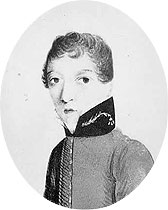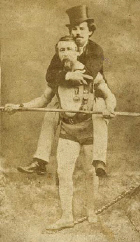5 is one number.
2 and 3 are 5.
Therefore 2 and 3 are one number.
5 is one number.
2 and 3 are 5.
Therefore 2 and 3 are one number.
Some children at play in a new-mown field, near Kensington gardens, horrid to relate, found the head of a female, with the skull split, the back part of it broken entirely off, and the nose cut away close to the face; the eyes were scooped out, and an iron spike was driven straight up the head through where the neck was amputated. To add to the horror of this occurrence, the head being extremely small, the children brought it, as a matter of curiosity, to show their parents. With a view to the discovery of the perpetrators of this deed, the circumstances were withheld from the neighbours for a time, when, in a lane adjoining the same field, the headless trunk was found extremely mutilated, the arms and thighs having been cut off close to the body. The limbs could not be traced. A hue-and-cry was now raised throughout the vicinity, where horror only kept pace with anxiety for a full investigation of all the circumstances. The result proved to be that some person, not having the fear of mischief before his eyes, had thus treated — a wooden doll!
— William Oxberry, ed., The Flowers of Literature, 1822

James Barry cut an impressive figure as a British military surgeon, working tirelessly to improve conditions for wounded soldiers around the globe. He worked with Florence Nightingale, performed the first successful cesarean section in Africa, and rose to the rank of inspector general of British military hospitals.
So when he died on July 25, 1865, the attendants were surprised to find he was a woman.
No one knows who she was, where she came from, or what led her to a career in military medicine. She’s buried in London under the alias she lived by.
See also Charley Parkhurst.
parnel
n. the mistress of a priest
In 1699, weary and discouraged at the poor sales of his new almanac, Francis Moore set to work on creating the next number.
“What shall I put in for June 4?” his assistant asked.
“Oh, cold and snow!” Moore said irritably.
Remarkably, snow actually fell on June 4. Sales of Old Moore’s Almanack bounded into the thousands, and it’s still being published three centuries later.

In 1774, a wild man was discovered in the neighbourhood of Yuary. This man, who inhabited the rocks near a forest, was very tall, covered with hair like a bear, very nimble, and of a gay humour. He neither did, nor seemed to intend, harm to any body. He often visited the cottages, without ever attempting to carry off any thing. He had no knowledge of bread, milk, or cheese. His greatest amusement was to see the sheep running, and to scatter them; and he testified his pleasure at this sight by loud fits of laughter, but never attempted to hurt them. When the shepherds (as was frequently the case) let loose their dogs at him, he fled with the swiftness of an arrow, and never allowed the dogs to come too near him. One morning he came to the cottage of some workmen, and one of them endeavouring to catch him by the leg, he laughed heartily, and then made his escape. He seemed to be about thirty years of age. As the forest is very extensive, and had a communication with a vast wood that belongs to the Spanish territories, it is natural to suppose that this solitary, but cheerful creature, had been lost in his infancy, and subsisted on herbs.
— John Platts, Encyclopedia of Natural and Artificial Wonders and Curiosities, 1876

French-born acrobat Jean-François Gravelet made a name for himself by crossing the gorge below Niagara Falls on a tightrope. The rope was 1,100 feet long and 160 feet above the water, and he crossed it successfully on June 30, 1859.
Evidently this wasn’t hard enough, because he later repeated the feat with a series of hair-raising variations: blindfold, in a sack, pushing a wheelbarrow, wearing stilts. That man on his back is his manager, Harry Colcord, who apparently concluded it must be pretty safe. Midway through one crossing, Gravelet actually sat down and cooked an omelette.
He died quietly of diabetes at age 73.

175 = 11 + 72 + 53
During the siege of Paris, the city’s starving populace ate its horses, dogs, and cats, and eventually even turned to rats and zoo animals. In Paris in Its Splendor (1900), Eustace Reynolds-Ball gives the menu of a popular restaurant in the Latin Quarter at the beginning of January 1871, “which gives a good idea of the gastronomic straits to which the light-hearted Parisians were reduced”:
See also Balloon Mail.